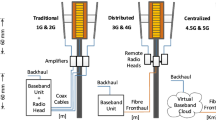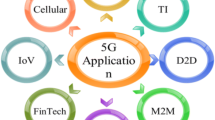Abstract
This paper presents an accurate approximation of the frame error rate (FER) of coded wireless communication systems with receiver diversity. The signals at different diversity branches experience non-independent non-identically distributed Rayleigh fading. The FER approximation is obtained with a threshold-based method. The analytical FER approximation is expressed as an explicit function of parameters related to modulation, coding, frame length, and number of diversity branches. Such a parametric FER approximation is different from most existing FER approximations that do not explicitly quantify many of the important parameters. Simulation results show that the proposed FER approximation can accurately predict the FER performance of a wide range of receiver diversity systems.


Similar content being viewed by others
References
Wu, J., Wang, G., & Zheng, Y. R. (2014). Energy efficiency and spectral efficiency tradeoff in type-I ARQ systems. IEEE Journal on Selected Areas in Communications, 32(2), 356–366.
Xiao, H., & Banihashemi, A. H. (2007). Estimation of bit and frame error rates of finite-length low-density parity-check codes on binary symmetric channels. IEEE Transactions on Communications, 55(12), 2234–2239.
Chatzigeorgiou, I., Wassell, I. J., & Carrasco, R. (2008). On the frame error rate of transmission schemes on quasi-static fading channels. In 42nd Annual Conference on Information Sciences and Systems, CISS (pp. 577–581).
Chatzigeorgiou, I., Wassell, I. J., & Carrasco, R. (2009). Threshold-based frame error rate analysis of MIMO systems over quasistatic fading channels. Electronics Letters, 45(4), 216–217.
Liu, T., Song, L., & Jiao, B. (2010). Threshold-based frame error rate analysis of incremental hybrid relay selection scheme. In Proceedings of IEEE Global Telecommunication Conference Globecom’10 (pp. 1–5).
Wu, J., & Xiao, C. (2008). Optimal diversity combining based on linear estimation of Rician fading channels. IEEE Transactions on Communications, 56(10), 1612–1615.
Wu, J. & Zheng, Y. R. (2012). Optimum multi-hop transmission strategies for energy constrained wireless sensor networks. In IEEE International Conference on Communications, ICC’12 (pp. 260–264).
Wang, G., Wu, J., & Zheng, Y. R. (2013). Optimum energy efficient communications for hybrid ARQ systems. In IEEE Global Telecommunication Conference Globecom’13.
Wang, G., Wu, J., & Zheng, Y. R. (2012). Cross-layer design of energy efficient coded ARQ systems. In Proceedings of IEEE Global Telecommunication Conference Globecom’12 (pp. 2351–2355).
Wang, G., Wu, J., & Zheng, Y. R. (2014). An accurate frame error rate approximation of coded diversity systems with non-identical diversity branches. In IEEE International Conference on Communications, ICC’14.
Prasartkaew, C., & Choomchuay, S. (2009). A design of parity check matrix for irregular LDPC codes. In IEEE 9th International Symposium on Communications and Information Technology, ISCIT 2009 (pp. 239–242).
Simon, M. K., & Alouini, M. (2000). Digital communication over fading channels: a unified approach to performance analysis. Hoboken: Wiley.
Acknowledgments
The work of G. Wang and J. Wu was supported in part by the U.S. National Science Foundation (NSF) under grant ECCS-1202075. The work of Y. R. Zheng was supported in part by the U.S. National Science Foundation under Grant ECCS-0846486.
Author information
Authors and Affiliations
Corresponding author
Rights and permissions
About this article
Cite this article
Wang, G., Wu, J. & Zheng, Y.R. An Accurate Frame Error Rate Approximation of Coded Diversity Systems. Wireless Pers Commun 86, 1377–1386 (2016). https://doi.org/10.1007/s11277-015-2995-9
Published:
Issue Date:
DOI: https://doi.org/10.1007/s11277-015-2995-9




